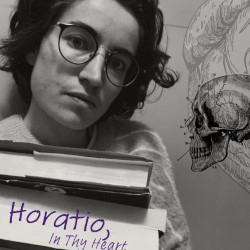Merlin Stevens brings their new show, Horatio, in Thy Heart, to this year’s Edinburgh Fringe.
“Glimpsed through the curtain of Hamlet’s story, scrawled in the margins of Shakespeare’s play, adrift and in love, Horatio draws his breath in pain and laughter to tell the story of someone strange, fractured and jangled out of tune – himself.
Is it weird to follow your situationship home for Christmas break? How can you keep your flight risk best friend safe when they make you swear a blood oath not to interfere? Can anyone see how much you’re breaking apart when they’ve decided you’re their rock to cling to?”
Where: Snug in Paradise in Augustines
When: 2-9 Aug
Ticket link: https://www.edfringe.com/tickets/whats-on/horatio-in-thy-heart
I asked Merlin to tell us more about their ideas about Horatio.

There are so many plays inspired by Shakespeare at the moment, especially Hamlet! What’s the enduring appeal of the Bard?
I think what’s so appealing about Shakespeare is the stunning specificity and lucidity of how he paints human psychology whilst writing poetically enough that the text is open to many truly fascinating interpretations.
The poetry itself is also breathtaking and visceral and something you can really sink your teeth into. All his plots, though mostly stolen, are intensely character-driven.
He had a good eye for what to steal, and you fall a bit in love with the way that he draws characters.
Your show shines a spotlight on Horatio. Why this character?
There’s been a lot of discussion in pop psychology about “main character syndrome,” a set of behaviours where you centre yourself and romanticize your problems and sometimes ignore or run roughshod over other people in the process.
I think there’s a corollary to this that I’ve been calling “supporting character syndrome” or “minor character syndrome” where you don’t think your yourself as the main character in your own life but rather as a supporting character in other people’s stories.
I think Hamlet and Horatio’s relationship presents a vivid example of this dynamic and I was wondering what would happen if I tried to coax Horatio out of Hamlet’s shadow (he seems to like it there).
I was also struck by the fact that while Hamlet feels very emotionally isolated and has immense difficulty connecting with people, Horatio genuinely seems like a people person, someone who is interested in being in community and who has an easier time getting on with people.
So I was interested in getting into the head of this person who is quite self-abnegating, but also needs a great deal of human connection and how he navigates this. He’s also fairly confident, quite academic in a quirky way, and calm and bold at the same time.
Horatio has an interesting edge to him as a strange person who knows how to pretend to be ordinary. I think Horatio is the character I relate to the most in Hamlet.
How did you get your start in theatre? Do you find Fringe festivals inspiring?
My very first experience of theatre was playing a fairy in Sleeping Beauty when I was seven years old, but my first professional theatre job was working on a San Francisco Shakespeare Festival production of Hamlet where I was Horatio’s understudy.
I’ve basically been running at the theatre world full tilt for the better part of the past decade.
I find Fringe festivals extremely inspiring because as a writer and an actor I’m always trying to get a better sense of the landscape and different ways of telling stories.
What are you looking forward to the most at Edinburgh?
I think I’m about equally looking forward to performing and seeing other shows.
I’m hoping to find some shows that surprise me and make me think about something in a different way.
Where can we see your work after Fringe?
My company, Achy Bits Productions is pretty much always putting on shows in London.
Up next I think we’re going to be restaging a new version of our play The Machiavelli Project about sad, bisexual, Renaissance political theorist Niccolò Machiavelli.
We also shot an experimental dance film about polyamory last year called Vermillion which is in post-production.
Like this:
Like Loading…
